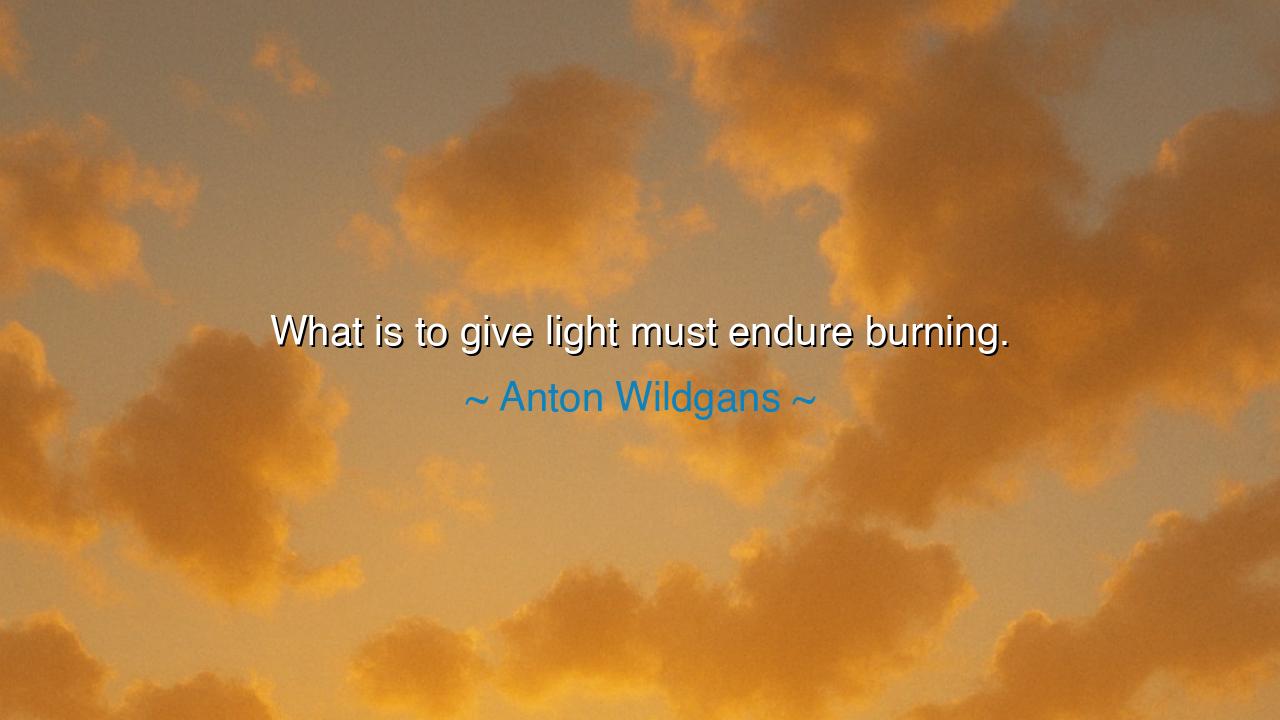
What is to give light must endure burning.






Anton Wildgans, the Austrian poet and playwright, gave us a truth as radiant as it is severe when he declared: “What is to give light must endure burning.” In these few words, he revealed the eternal paradox of creation and sacrifice: that no flame shines without consuming itself, that no lamp brightens the darkness without enduring the pain of fire. To be a source of light to others, whether through love, wisdom, or courage, is to accept the cost of being tested, scarred, and refined by trial.
The ancients understood this law of existence. The myth of Prometheus tells of the Titan who stole fire from the gods to give light to mankind. For this gift he was chained to a rock, his body torn each day by an eagle. He endured burning torment so that humanity might live in light. Wildgans’s words echo this myth: those who illuminate the path of others do not walk an easy road themselves. The fire that blesses the world is always born of suffering willingly embraced.
Consider the life of Joan of Arc. She rose from obscurity, a peasant girl guided by visions, to lead armies and inspire a nation. She was a beacon of light to the French in their darkest hour. Yet her very radiance drew flames—betrayal, condemnation, and the fire that consumed her body. Though she endured burning in both spirit and flesh, her light did not perish; it shone brighter through her sacrifice, and it continues to burn centuries after her death. To give light, she endured burning.
The same truth was lived by Mahatma Gandhi. His light was nonviolence, his torch was truth, and with these he kindled a movement that shook the foundations of an empire. But that light came at the cost of imprisonment, beatings, and endless sacrifice. He chose burning over comfort, willingly placing his body and soul in the crucible of trial so that his people might walk free. The suffering he bore was the price of the illumination he gave to the world.
In our own lives, this wisdom must not be forgotten. To love deeply is to endure wounds; to create beauty is to suffer labor; to speak truth is to risk rejection; to pursue justice is to invite resistance. The fire is not avoidable—it is the condition of the light. Many shrink from the burning and thus their light never shines. But those who accept it, those who endure, become torches in a darkened world. Endurance is the price of radiance.
Yet this endurance is not in vain. The candle does not mourn its burning, for in being consumed it fulfills its purpose. So too the soul, when it suffers for love, truth, or goodness, must remember that the burning is not destruction but fulfillment. It is the very process by which one’s life acquires meaning, the way in which the ordinary is transfigured into the eternal. The fire is the path to immortality.
The lesson, then, is clear: do not fear the fire. When life calls you to give light—whether in your family, your community, or your world—accept the trials that come with it. Do not seek a path free of burning, for such a path is free also of radiance. Instead, embrace hardship as the furnace in which your light is made strong, steady, and enduring.
Practical action flows from this teaching: Ask yourself daily, What light am I called to give? Then, when trials come, remember Wildgans’s wisdom: the pain you endure is not meaningless—it is the fuel of your flame. Serve others even when weary, love even when it hurts, speak truth even when it costs. For as surely as the candle endures burning to light the room, so must we endure suffering to illuminate the path for those who come after us. What is to give light must endure burning—and in the burning, we become eternal.






AAdministratorAdministrator
Welcome, honored guests. Please leave a comment, we will respond soon